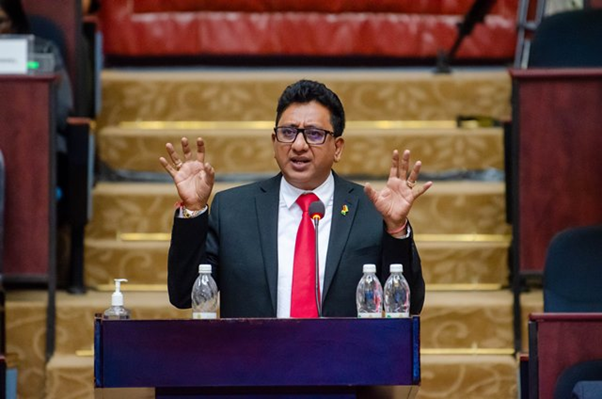Attorney General and Minister of Legal Affairs Mohabir Anil Nandlall, SC, characterized Venezuela’s presentations to the International Court of Justice (ICJ) as ‘biased and prejudicial.’ Minister Nandlall made these remarks following the conclusion of oral hearings on Wednesday regarding Guyana’s request for provisional measures in the case related to the Arbitral Award of 3 October 1899 (Guyana vs Venezuela).
Delivered at the Peace Palace in The Hague, Vice President of Venezuela, Delcy Rodrigues, portrayed Guyana as an aggressor state, accusing it of seeking ‘judicial colonialism’ by urging the court to intervene in the country’s internal affairs, specifically the national referendum scheduled for December 3, 2023.
“It’s a dialogue that is completely biased, completely prejudicial…with nationalistic and patriotic fervour directed obviously to the population of Venezuela, and that has been their narrative from the inception,” the minister expressed.
The Attorney General clarified that Guyana’s objective is not to impede the national referendum but to secure provisional measures from the court, preventing any annexation attempts on Guyana’s Essequibo region. Minister Nandlall reiterated that Venezuela’s internal referendum should not authorize actions violating another country’s sovereignty and territorial rights, justifying the need for the intervention of the World Court.
On September 21, 2023, Venezuela’s National Assembly passed a resolution advocating a referendum on the unsupported claim to two-thirds of Guyana’s territory. Following this, the National Electoral Council of the Bolivarian Republic of Venezuela formulated five questions for the national referendum. Of these questions, all geared toward advancing Venezuela’s baseless claims, the third and fifth are particularly detrimental.
Question three aims to affirm Venezuela’s “historical position of not recognizing the jurisdiction of the International Court of Justice” as the ultimate and binding method of dispute resolution. Meanwhile, question five boldly seeks the Venezuelan people’s approval for establishing a new Venezuelan State in Guyana’s Essequibo Region, incorporating it into Venezuela’s national territory. Additionally, it proposes granting Venezuelan citizenship and identification cards to the population of the Essequibo Region.
“We are asking to rephrase the questions. Ask questions that will not undermine and subvert the legal process but will interfere with our territorial rights and sovereignty. We are also asking that…At least the court must say something about their ability to enforce those referendum questions. Because the enforcement of the referendum questions will involve an annexure, invasion, and occupation of territory that is lawfully Guyana’s,” the minister further explained.
Guyana presented its oral arguments to the Court on November 14, while Venezuela presented its case on Wednesday. The court’s president has indicated an intention to deliver the decision to the involved parties as promptly as possible.
On November 6, Guyana’s National Assembly unanimously passed a motion reiterating the nation’s commitment to sovereignty and territorial integrity and condemning Venezuela’s proposed referendum. The unanimous passage of this motion followed extensive discussions between His Excellency Dr. Mohamed Irfaan Ali and the Opposition Leader Aubrey Norton, demonstrating a united front on this nationally significant issue.
In 2018, Guyana submitted an application to the ICJ, seeking confirmation of the legal validity and binding nature of the 1899 Arbitral Award regarding the boundary between the then British Guiana and the United States of Venezuela. The application also aimed to establish that the 1899 award constituted a “full, perfect, and final settlement” of all matters on determining boundary lines between the colony of British Guiana and Venezuela.
Special Reporter, Georgetown, Guyana





